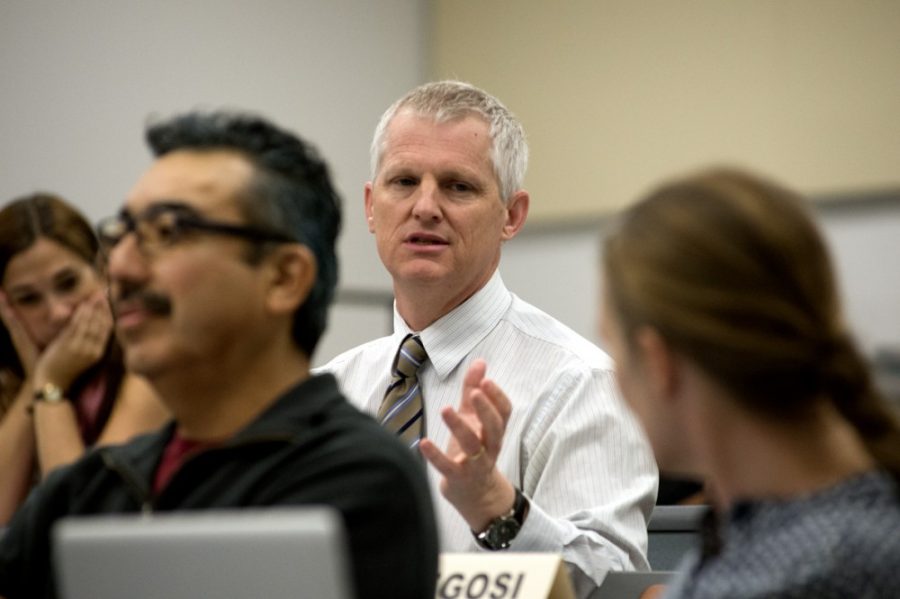This article has been updated with an extended quote by Karen Seat, director of the religious studies program at the UA, that was cut in the original version.
Old discussions about a possible unification of two UA colleges will resurface at a retreat this weekend.
Faculty members and administrators from the College of Humanities and the College of Social and Behavioral Sciences will gather this Saturday to discuss the possibilities of closer collaboration between the two colleges. Because these conversations have been ongoing for a few years, UA Provost Andrew Comrie decided to organize a retreat where faculty members’ ideas could be put on the table, saying he hopes a productive conversation will come out of the workshop-style meeting.
Some of the possibilities include shared degree programs and research collaboration, Comrie said. Merging the colleges is also a possibility, but Comrie said that nothing is set in stone yet.
“It’s a chance to get people talking,” Comrie said.
The retreat is invitation-only and is meant to serve as a brainstorming session for faculty members.
Collaborative ideas may produce more interesting options or new majors for students, Comrie said.
John Paul Jones, dean of the College of Social and Behavioral Sciences, said that he’s already heard divided feedback from faculty members; some support the idea of unification while others are concerned about the potential aftermath.
These conversations are happening again because some of the units and majors offered in one college are traditionally in the other college, Jones said. Philosophy, for example, is typically a program housed in the humanities. But when the UA reorganized its liberal arts about 30 years ago, it put programs such as philosophy in the College of Social and Behavioral Sciences.
Jones said there’s a tendency in academia to look at the organizational charts of colleges within a university and find the right organizational chart to preserve faculty’s interests and those of their students.
“Thirty years ago, everybody said the best thing to do is to break everything up,” Jones said, “and now the pendulum has swung back.”
While merging the colleges is still just one of many possibilities, Mary Wildner-Bassett, dean of the College of Humanities, said that reorganizing the colleges is unnecessary as there is already a lot of collaboration between the College of Humanities and other colleges. Students who get a degree in global studies have to take courses from both colleges.
Restructuring and possibly creating one college out of two could cause problems with funding as well, Wildner-Bassett said, due to the already different ways the two colleges distribute funding to their departments. Merging might also cause changes that could lead to administrators losing their jobs, she added.
“I’m not worried about my position,” Wildner-Bassett said. “But I am very concerned about the way that administrative staff might have concerns about all sorts of things in a merger like that.”
Karen Seat, director of the religious studies program, also said there is already a lot of interdisciplinary collaboration among colleges at the university, and barriers for working across colleges are pretty low. The humanities are valued throughout the university, Seat said.
“It’s really important that we maintain and support administrative structures that will support and foster a wide variety of disciplines,” Seat said. “I think there are many disciplines that are currently thriving in the College of Humanities, and my hope is that those disciplines will continue to thrive.”
Wildner-Bassett said she’s concerned that merging the colleges might also create tensions among faculty members, making it difficult for the colleges to collaborate. Merging would also bring to question the value of each of the colleges to the university, she added.
“So I don’t know that structural unification or a merger is necessary for that, and it might even be a little detrimental,” Wildner-Bassett said. “If that were to happen, it would eliminate two colleges.”
Comrie said that using the term “merger” this early in the conversation comes with a lot of connotations, which could make it more difficult to have a progressive conversation about collaboration between the colleges.
“People will just assume the worst,” Comrie said. “It’d be much easier if we talk about reconfiguration or come up with creative new ideas.”









